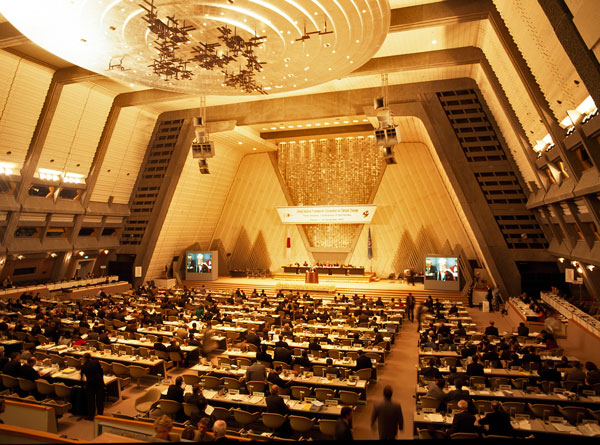The Federal Executive Council (FEC), presided over by Vice-President Yemi Osinbajo, on Wednesday, November 14, 2018 approved the ratification of the Doha Amendment of the Kyoto Protocol on climate change.

Minister of State for Environment, Alhaji Ibrahim Usman Jibril, made this known when he briefed State House correspondents on the outcome of the weekly meeting of the Council at the Presidential Villa, Abuja.
According to the minister, the protocol concerns the UNFCCC, an international environmental treaty adopted on May 9, 1992. Climate change is regarded as a major global issue across the world.
The Doha Amendment establishes a second commitment period (2013 to 2020) for the Kyoto Protocol, an international agreement to reduce the emissions of greenhouse gases (GHGs). The Kyoto Protocol to the United Nations Framework Convention on Climate Change (UNFCCC) was adopted in 1997 by the third Conference of the Parties (COP3) in Kyoto, Japan.
The Federal Ministry of Environment presented a memo which was taken and approved for the ratification of the Doha amendment of the Kyoto Protocol.
“This Protocol concerns the UN framework convention on climate change, which is a major global issue across the world now.
“The Protocol was crafted in 2004 and Nigeria is a party to that and the initial period of commitment of the Kyoto Protocol was from 2008-2012 and, after that, the new segment now is 2013-2020,’’
He maintained that the essence of the protocol was to commit advanced countries to mitigate the effects of gas emissions on developing countries.
The minister further stressed that the Doha Amendment of the Kyoto Protocol was essentially meant to assist countries like Nigeria that were not producing any significant emission but suffering the consequences.
“The essence of this protocol is to commit advanced or developed countries that are mostly industrialised and are at the forefront of production of gas emissions, which are harmful to the environment, leading to climate change and therefore causing global problems environmentally.
“So, the Doha Amendment of the Kyoto Protocol is essentially to assist countries like Nigeria, which are developing and are not producing any significant emission but are suffering the consequences. We are all aware of flooding that we experienced this year, and this has been going since 2012.’’
According to the minister, by ratifying the protocol, Nigeria and other developing countries stand to gain a lot in form of financial assistance and access to technology.
“The benefit Nigeria stands to gain from this Doha Amendment of the Kyoto Protocol is that, first of all, once the amendment is ratified as we want it to be, there will be access to financial assistance which will help in motivating and adapting to impact of climate change.
“Secondly, there will be access to technology and capacity building and there will also be networking with other nations and organisations, who are more advanced and can be of help to us as a country.
“Lastly, continuation of flexible mechanisms and contribution to global efforts as no one country has the solution for this problem alone. So, the idea is to team up and then get the developing countries to be assisted effectively, he added.
He said the Attorney General of the Federation and Minister of Justice, Abubakar Malami, would provide the instrument of ratification, which would also be signed later by the President and be deposited at the United Nations headquarters in New York.
On the Ogoni cleanup, Jibril said the Federal Government had so far generated over $180 million for the commencement of the exercise in the next few weeks.
The minister disclosed that about 21 contractors would be mobilised to site as the procurement processes had reached the final advantaged stage.
He said: “Yesterday (Nov. 13) the Ministerial Tender Board sat to consider the submission of the procurement department of Hydrocarbon Pollution Remediation Project (HYPREP) and 15 lots were up for grabs.
“On Friday, the Governing Council of the Ogoni Trust Fund will meet and ratify this, and we hope that, by the next week, these letters will be out, and the contractors will be mobilised to site.
“You must ask whether there is funding, yes, of course there is funding. Again, this is the first time the government has done something.
“Because of the confidence that the oil companies have in the government, because of the governance structures that are put in place, the opening of the Ogoni Trust Fund will be able to mobilise $180 million from the oil companies.
“From the NNPC, SPDC and other ventures, they have mobilised $180 million and it is in the escrow account with the Standard Chartered Bank of London and the Board of Trustee is managing that.’’
Usman observed that the Buhari administration had indicated genuine commitment towards ensuring smooth implementation of the Ogoni cleanup.
He, therefore, enjoined all stakeholders, including the affected communities, to continue to support and show more understanding for a hitch-free cleanup.
“So, as far as we are concerned, we can beat our chest and say that the Buhari administration has shown the way forward on this cleanup exercise and we hope and pray that the people whom we are working for, will have cause to laugh and smile very soon,’’ he added.
By Ismaila Chafe
